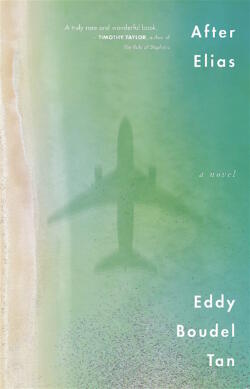1383 Wedding at the Ōmeyōcān Hotel
After Elias
by Eddy Boudel Tan
Toronto: Dundurn Press, 2020
$21.95 / 9781459746428
Reviewed by Miranda Marini
*
 After reading, reviewing, and thoroughly enjoying Eddy Boudel Tan’s sophomore novel, The Rebellious Tide (2021), I immediately knew that I had to read his debut novel, After Elias (2020). It is, perhaps, a little unconventional to read these texts out of publication order, but while they both delve into the intricacies of mental health, identity, and flawed human nature, their storylines and characters are unrelated. Initially, I had intended to read After Elias purely for my own enjoyment; however, when the opportunity arose to review the novel, I jumped at the chance, eager to explore Boudel Tan’s characters as well as the novel’s narrative style and representations of grief. As noted on his website, Boudel Tan “want[s] people to feel things that are explosive and unexpected, to find new ways of seeing the familiar” (Eddy Boudel Tan), and through the interwoven layers of psychological traumas, family dynamics, and well-kept secrets, he creates a heart-wrenching yet compelling representation of human nature and tragedy.
After reading, reviewing, and thoroughly enjoying Eddy Boudel Tan’s sophomore novel, The Rebellious Tide (2021), I immediately knew that I had to read his debut novel, After Elias (2020). It is, perhaps, a little unconventional to read these texts out of publication order, but while they both delve into the intricacies of mental health, identity, and flawed human nature, their storylines and characters are unrelated. Initially, I had intended to read After Elias purely for my own enjoyment; however, when the opportunity arose to review the novel, I jumped at the chance, eager to explore Boudel Tan’s characters as well as the novel’s narrative style and representations of grief. As noted on his website, Boudel Tan “want[s] people to feel things that are explosive and unexpected, to find new ways of seeing the familiar” (Eddy Boudel Tan), and through the interwoven layers of psychological traumas, family dynamics, and well-kept secrets, he creates a heart-wrenching yet compelling representation of human nature and tragedy.
The novel itself instantly situates the reader within this unexpected and unimaginable tragedy, which has completely and utterly upended Coen Caraway’s seemingly happy life. He has the job of his dreams, the support and loyalty from unparalleled friendships, the man he loves wholeheartedly, and the perfect wedding venue to tie it all together. A week before the wedding, however, this illusion of perfection and happiness shatters when Flight XI260 crashes into the Arctic Ocean, killing its passengers, its crew, and its pilots. Including Coen’s fiancé, Elias Santos – one of the pilots.

Amidst event planning, flower arranging, and realising his fiancé won’t be joining him at their destination wedding at the Ōmeyōcān Hotel in Mexico, Coen grapples with this grief and tries to navigate life after Elias’s death. Intent on challenging the notion of doing “the right and proper and normal thing to do in this situation” (p. 106) and despite continual scrutiny of his unconventional approach to grief and memorial, Coen encourages his wedding guests to join him at the resort to celebrate Elias’s life in place of the wedding he and Elias had planned. However, as investigators uncover a cryptic message left by Elias moments before his death and as they speculate about his involvement in the crash, Coen must confront the past, its secrets, and the shadow that follows him to discover the truth about Elias and about himself.
To uncover this truth, Eddy Boudel Tan intricately blends the past and present in this first-person narrative, alternating between the days, months, and years leading up to the crash and the subsequent days after it. These shifts in timeline give the reader insight into Coen’s relationships with his fiancé, his family, his friends, and his mental health, offering a complex understanding of his motivations and mental state, and as the story progresses, it becomes apparent that both Coen and Elias are caught up in and “torn between past and present” (p. 286). As secrets are revealed and more questions arise, Boudel Tan invites the reader to question the reliability of first-person narratives, immersing the reader into the fragility of the human mind as well as its strength and capacity for self-preservation.

This fragility and ensuing strength are characterized and expressed through Coen’s shadow. In the beginning, the shadow is an elusive, fragmented entity that Coen calls “an old friend” (p. 1) – a nameless, yet familiar, constant in his life, which leaves the reader wondering about its origins. Is it supernatural in nature? Is it the embodiment of the human condition? Is it a manifestation of grief, doubt, fear, insecurity, or trauma? Or is it a metaphoric representation of Coen’s past? Regardless, Boudel Tan has intentionally left its significance ambiguous until the very end of the story, and both the reader and Coen are left to speculate about its many meanings, which are as “explosive and unexpected” as Boudel Tan had hoped. Isla de Espejos, the Mexican island where Coen and Elias had planned to be married, also plays a pivotal role in this characterization of fragility and strength. Loosely translated, Isla de Espejos means ‘Island of Mirrors,’and the island then acts as a place of confrontation – a metaphoric and literal space for Coen to confront the past, his personal insecurities, and the simmering doubts about Elias’s innocence and love for him.
As a reader, I’ll admit that these confrontations and realisations left me raw, and I’ll forewarn future readers that After Elias deals with difficult themes that may be hard to read. However, I believe that is Eddy Boudel Tan’s true gift – to challenge and expose flawed human nature, which he does through characters who are undeniably relatable. In After Elias, he challenges normative perceptions of grief and healing, he reiterates the harm of keeping secrets, and he advocates the importance of mental health. In the end, I would recommend this novel to anyone interested in a psychological rollercoaster, and I am eager to read any future works Boudel Tan creates.
*

Born and raised in Kamloops, Miranda Marini teaches at Thompson Rivers University in the English and Modern Languages Department, where she pursues her interests in British Columbian and Canadian Literature. Academically, her interests include ethnobotanical relationships and interactions between human and non-human environments, particularly in relation to the representations of place, space, and landscapes in British Columbia and Canada. When she isn’t busy teaching, she can usually be found working on various poems, short stories, essays, and novels – all forthcoming — in addition to spending time with her three dogs: Walle, Levi, and Marley. Editor’s note: Miranda Marini has also reviewed books by Karina Halle, Eddy Boudel Tan (The Rebellious Tide), Theresa Kishkan, Frances Boyle, Barbara Lambert, Martha Ostenso, Roz Nay, and Winona Kent for The Ormsby Review.
*
The British Columbia Review
Publisher and Editor: Richard Mackie
Formerly The Ormsby Review, The British Columbia Review is an on-line journal service for in-depth coverage of BC books and writers. The Advisory Board consists of Jean Barman, Wade Davis, Robin Fisher, Cole Harris, Hugh Johnston, Kathy Mezei, Patricia Roy, Maria Tippett, and Graeme Wynn. Provincial Government Patron (since September 2018): Creative BC. Honorary Patron: Yosef Wosk. Scholarly Patron: SFU Graduate Liberal Studies.
“Only connect.” – E.M. Forster
2 comments on “1383 Wedding at the Ōmeyōcān Hotel”